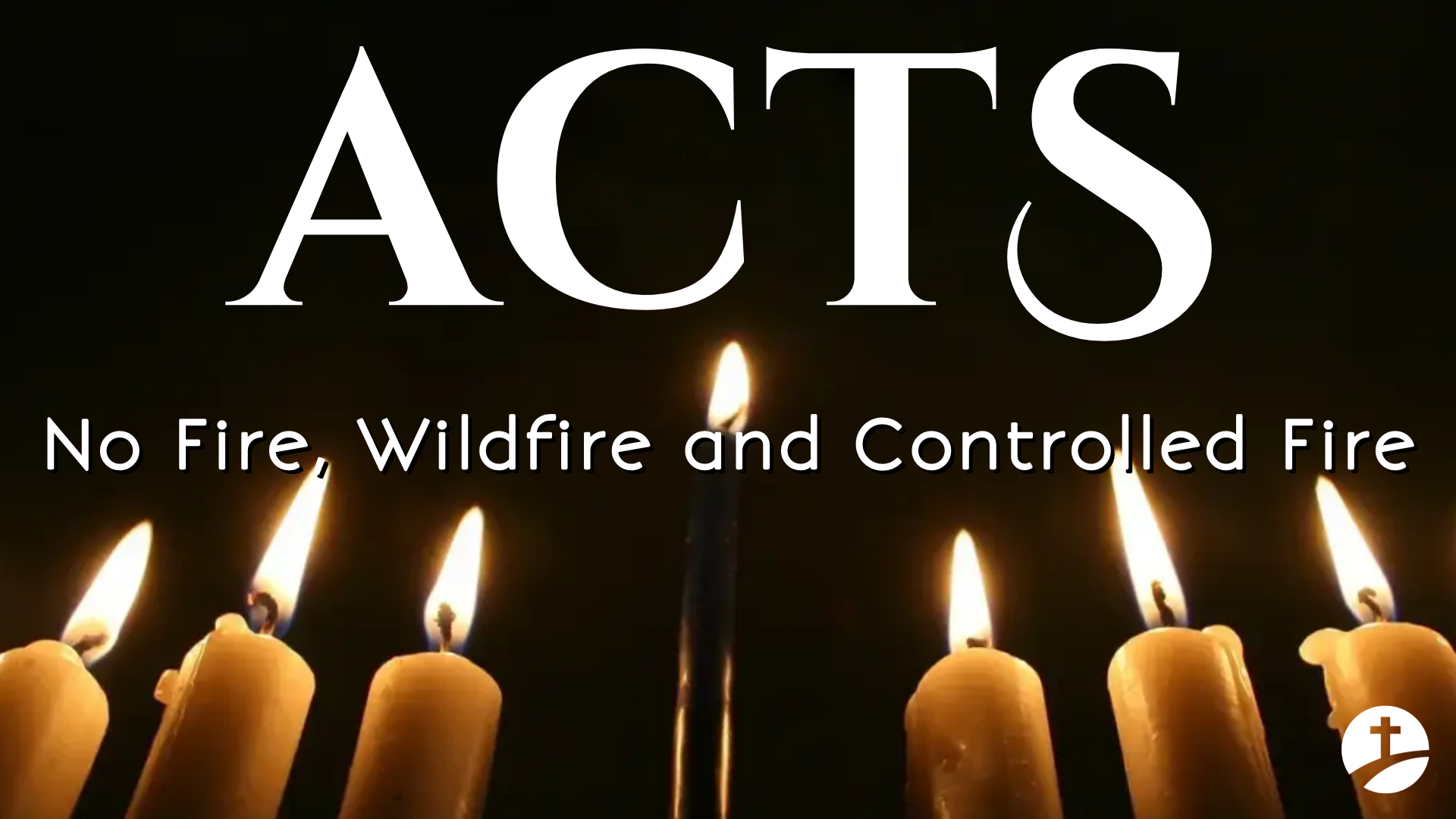Acts 18:24-19:7 NIV
24 Meanwhile a Jew named Apollos, a native of Alexandria, came to Ephesus. He was a learned man, with a thorough knowledge of the Scriptures. 25 He had been instructed in the way of the Lord, and he spoke with great fervor and taught about Jesus accurately, though he knew only the baptism of John. 26 He began to speak boldly in the synagogue. When Priscilla and Aquila heard him, they invited him to their home and explained to him the way of God more adequately.
27 When Apollos wanted to go to Achaia, the brothers and sisters encouraged him and wrote to the disciples there to welcome him. When he arrived, he was a great help to those who by grace had believed. 28 For he vigorously refuted his Jewish opponents in public debate, proving from the Scriptures that Jesus was the Messiah.
Wildfire: Apollos
- Learned, thorough knowledge of the Scriptures: Educated as a Jew, well-spoken and eloquent
- Instructed in the way of the Lord, taught Jesus accurately: Presumably knew about Jesus and His ministry and Messiahship, but only to a limited extent
- Spoke with great fervor, spoke boldly: Zealous about the message of Jesus, unafraid to speak out about Him
- Knew only the baptism of John: Zeal was based on an incomplete portrait of Jesus, was acting and preaching an incomplete message
Apollos in many ways exemplifies an ideal disciple, but still needs further instruction and accountability. A person may possess obvious spiritual gifts, knowledge, ministry activity and sense of calling, but this speaks nothing of their character and way of life. The church is not to elevate them or appoint them to leadership unless they are tested and proved faithful (1 Timothy 3:6; 5:21-22). Apollos willing to submit himself to Priscilla and Aquila and learn from them, not only helped refine his doctrine, but proved him to be of noble character.
1. BE TEACHABLE: 2 Timothy 2:1-2.
2. BE ACCOUNTABLE: 1 Corinthians 4:14-21.
3. BE A SERVANT: Philippians 2:19-22.
4. BE HUNGRY FOR MORE OF GOD: Matthew 5:6.
19 While Apollos was at Corinth, Paul took the road through the interior and arrived at Ephesus. There he found some disciples 2 and asked them, “Did you receive the Holy Spirit when you believed?”
They answered, “No, we have not even heard that there is a Holy Spirit.”
3 So Paul asked, “Then what baptism did you receive?”
“John’s baptism,” they replied.
4 Paul said, “John’s baptism was a baptism of repentance. He told the people to believe in the one coming after him, that is, in Jesus.” 5 On hearing this, they were baptized in the name of the Lord Jesus.6 When Paul placed his hands on them, the Holy Spirit came on them, and they spoke in tongues and prophesied. 7 There were about twelve men in all.
No Fire: The Disciples at Ephesus
- Some disciples: Disciples of who? This has been debated. Luke usually uses the word, mathetai, to describe followers of Jesus, but that word can used for disciples of many different masters, including John the Baptist. Perhaps like Apollos, these disciples also professed Christ, but only to extent that John the Baptist knew of him. More likely, it appears they were devotees of John the Baptist decades after his passing, and had not even heard of Jesus (v. 4). Whatever the case, their precise beliefs are unclear from the text.
- Did you receive the Holy Spirit, What baptism did you receive: Implied here is that reception of the Holy Spirit was a tangible experience (Gal. 3:2). From Pentecost on, all who believed in Jesus were baptized and received the promised Holy Spirit (2:38-39). These two questions helped Paul better discern what these disciples knew and where they stood.
- Paul instructed them: They did not know about the One who came after John
- Paul had them baptized in water: This signaled their conversion and belief in Christ.
- Paul placed hands on them to received the Holy Spirit: They received the promised Holy Spirit and spoke in tongues and prophesied, in keeping with the Pattern of Pentecost.
It is hard to categorize the disciples at Ephesus. We might piece together that they had once, long before, encountered John prior to Jesus’ public ministry, and adapted his ascetic lifestyle while waiting for the kingdom of God and the Messiah to come. They might have been living like this for decades until Paul came along and preached Christ to them.
There is ample evidence of the discipleship of John the Baptist:
- Jesus’ first disciples came from John (John 1:35-37)
- John’s disciples were engaged in a controversy over cleansing (John 3:22-26)
- The disciples of John joined with the disciples of the Pharisess in questioning Jesus as to why His disciples did not fast (Matthew 9:14; Mark 2:18; Luke 5:33)
- While he was in prison, John sent to disciples to question Jesus about His messianic identity (Matthew 11:2-3; Luke 7:18-19)
- John’s disciples outlived him, continuing to pray his prayers (Luke 11:1) and being found as far as Alexandria and Ephesus (Acts 18:24-25; 19:1-3)
- There is no mention of John expounding Scripture to his disciples, but teaching them prayer, fasting and personal piety in preparation for the Messianic age
- For reasons unknown, many of John’s disciples continued in Judaism after his death, seemingly missing the fact that John’s entire ministry was meant to point to Jesus (John 3:27-30)
Theological nuance aside, the Disciples at Ephesus typify people who, albeit religious, have not experienced the power of God, and may not have even been converted! Paul cut to the heart of the matter: They had not received the Holy Spirit. Some need to experience the Spirit in regeneration, and others need Spirit baptism.
